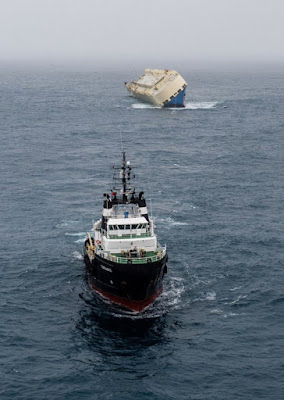I've only left Sydney once aboard an ocean liner, the
Bretagne, which sailed from the Pyrmont terminal (now amalgamated into the modernized quarter of Darling Harbour) in the early hours of the first morning of January 1962. Everything about that departure was magic, and remains legendary, indeed mythical, in my memory today. In the context of that departure, there were several signs of imminent events that would shape my life. However, as a naive 21-year-old country lad [whose only significant achievement was three or four years of serious professional experience as a computer programmer with IBM], it was unthinkable that I might have recognized any of these positive omens in the port of Sydney on that final evening of 1961.

The vessel itself had been built a decade earlier for a French company named
SGTM based in Marseille. [In the name,
Société générale de Transports maritimes, notice the amusing spelling fault: the first
r in
Transports has been omitted.] Besides, the
Bretagne had an almost identical sister ship named the
Provence. The Greek company Chandris had purchased and refitted the
Bretagne a few months before I sailed from Sydney. This Greek ownership meant that, towards the end of the voyage, we were offered a splendid encounter with Athens. Little did I know that, within a couple of years, I myself would be employed as a sailor and helmsman on a Greek ship, the
Persian Cyrus, which stopped for a memorable day or so in the great French port of Marseille. I could not have imagined, either, that I would soon be falling in love with, and marrying, a girl from the French province named Bretagne.
Here's a postcard of the
Bretagne under French colors:

Under Greek colors, as I knew her, the vessel was painted white:

Shortly after my trip aboard the
Bretagne, the Greeks decided to anglicize her name to
Brittany. This must have been an ill omen, for the ship was burnt out in April 1963 at its home port of Piraeus.
I've often thought that stepping aboard a great ship and sailing to foreign lands is one of the greatest experiences I can imagine. Today, I was interested to see that a newly refitted liner, the
Pacific Dawn, has just been launched from Sydney.

She's viewed here from the Opera House corner of Circular Quay:

As a child, when I was anguished by dark thoughts of death and the futility of our existence, I often forced myself to conjure up in my imagination the image of a giant ship plowing through the seas, to restore me instantly to a peaceful state of mind. Even today, I still ignore the origins or profound sense of this tactic, not to mention the reasons why it generally worked.








